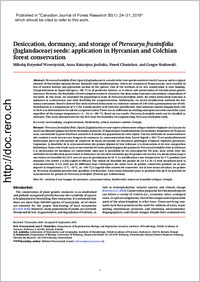Desiccation, dormancy, and storage of Pterocarya fraxinifolia (Juglandaceae) seeds: application in Hyrcanian and Colchian forest conservation
- Wawrzyniak, Mikołaj Krzysztof Department of Reproduction Biology and Population Genetics, Institute of Dendrology, Polish Academy of Sciences, Parkowa 5, 62-035, Kórnik, Poland.
- Jasińska, Anna K. Laboratory of Systematics and Geography, Institute of Dendrology, Polish Academy of Sciences, Parkowa 5, 62-035, Kórnik, Poland.
- Chmielarz, Paweł Department of Reproduction Biology and Population Genetics, Institute of Dendrology, Polish Academy of Sciences, Parkowa 5, 62-035, Kórnik, Poland.
- Kozlowski, Gregor Department of Biology, University of Fribourg, Chemin du Musée 10, CH-1700 Fribourg, Switzerland. - Natural History Museum Fribourg, Chemin du Musée 6, CH-1700 Fribourg, Switzerland.
-
16.10.2019
Published in:
- Canadian Journal of Forest Research. - 2019, vol. 50, no. 1, p. 24–31
English
Pterocarya fraxinifolia (Poir.) Spach (Juglandaceae) is a model relict tree species native to South Caucasus and is a typical element of threatened riparian forests. Intensive land transformations, which are common in Transcaucasia, have resulted in loss of natural habitat and population decline of the species. One of the methods of ex situ conservation is seed banking. Cryopreservation in liquid nitrogen (−196 °C) is of particular interest, as it allows safe preservation of valuable plant genetic resources. However, the feasibility of seed cryopreservation is related to the desiccation tolerance and intrinsic composition of the seeds. In this study, we examined the physiological traits of Pterocarya fraxinifolia seeds, for which desiccation tolerance is unknown or controversial, and their feasibility for cryopreservation. Additionally, we tested stratification methods for dormancy assessment. Results showed that seeds survived desiccation to a moisture content of 2.8% with a germination rate of 64%. Stratification at a temperature of 3 °C for 8 weeks proved to be both fast and effective. Seed moisture content ranging from 2.8% to 18.1% was determined to be safe for cryopreservation. There was no difference in seedling emergence in seeds stored for 1 year regardless of the storage temperature (−3, −18, or −196 °C). Based on our results, Pterocarya fraxinifolia seeds can be classified as orthodox. This study demonstrates for the first time the feasibility of cryopreserving Pterocarya fraxinifolia seeds.
- Faculty
- Faculté des sciences et de médecine
- Department
- Département de Biologie
- Language
-
- English
- Classification
- Biological sciences
- License
- License undefined
- Identifiers
-
- RERO DOC 328166
- DOI 10.1139/cjfr-2018-0519
- Persistent URL
- https://folia.unifr.ch/unifr/documents/308436
Statistics
Document views: 74
File downloads:
- koz_dds.pdf: 218
